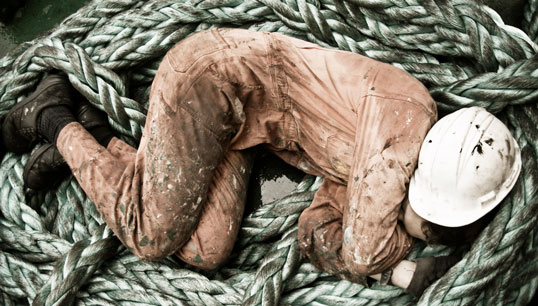- Topics
- Campaigning
- Careers
- Colleges
- Community
- Education and training
- Environment
- Equality
- Federation
- General secretary message
- Government
- Health and safety
- History
- Industrial
- International
- Law
- Members at work
- Nautilus news
- Nautilus partnerships
- Netherlands
- Open days
- Opinion
- Organising
- Podcasts from Nautilus
- Sponsored content
- Switzerland
- Technology
- Ukraine
- United Kingdom
- Welfare
Systemic failures in work and rest hours regulations putting lives at risk
9 November 2020

An explosive new report from the World Maritime University has found widespread malpractices in the recording of work and rest hours with a culture of adjustment – both on and off ship – normalising fatigue among seafarers that could lead to serious casualties, loss of life and environmental damage
There are 'widespread malpractices' in the recording of work and rest hours in the shipping caused by 'insufficient safe manning levels' according to a shocking new report by the World Maritime University, with researchers finding that over 85 percent of the non-seafarer participants were aware of recording malpractices.
The research confirms the outcome of earlier studies and what many in the industry already knew, that the altering of records is commonplace and there has been a failure by all stakeholders – seafarers, companies, flag and port states – to address the issue.
The implications are stark, with researchers warning: 'The inability to enforce existing rules may seriously affect seafarers' health, safety and cognitive performance. Consequently, decision making impaired by fatigue may lead to serious accidents and large-scale environmental damage.'
The report, titled 'Evaluating the implementation of the current maritime regulatory framework on rest and work hours' took a detailed look into the implementation of the regulatory and administrative framework. It made use of semi-structured interviews and focus group discussions with a wide range of stakeholders, including seafarers, and port state control officers as well as representatives from shipowners' organisations, industry organisations, maritime non-governmental organisations, and casualty investigators.
Unbridgeable gap
All stakeholders including shipowner representatives were in agreement that the continuing persistence of 'unrealistic' crewing levels was forcing seafarers to work unsustainable hours and, worryingly, the findings indicate that the principles listed in the International Maritime Organization (IMO) resolution for establishing minimum safe manning are not adhered to 'in most instances'. The report argues that it is this unbridgeable gap between workload and the number of personnel that is the key driver of violations and recording malpractices.
The desire for cost savings on the part of shipowners, increased competition among flag states for tonnage and 'regulatory inflation' on seafarers were found to be the causes of this divide, which has been allowed to grow by a lack of effective international regulation. This pressure, which is exacerbated during peak workload conditions leads to violations of work/rest hour requirements being both commonplace and unavoidable.

The commonplace nature of the violations has led to what is described as a 'culture of adjustment', whereby work hours are either under-reported by seafarers, or work/rest hour records are manipulated later for compliance purposes. The regularity of breaches was summed up by one seafarer, who said: 'After six hours cargo watch, I have to get the passage plan ready before the ship sailing. So, this is extra time and I cannot record every time. I have to indicate that extra time as rest hours otherwise there will be a violation.'
The report found that the practice of recording hours was seen by many on board as a time consuming and often pointless paper exercise, which would simply be manipulated to give the impression of compliance in order to avoid creating additional issues or work.
The altering of records is commonplace and there has been a failure by all stakeholders – seafarers, companies, flag and port states – to address the issue
Structural incentives
The functionality of the software used by many companies was found to incentivise seafarers to adjust their work/rest hours to ensure conformity with regulations, with one of the seafarers saying: 'Software indicates the violations. When we try to put the actual hours for example during bunkering, then it will show RED.' This live warning influenced seafarers to change their answers based upon false entries to eliminate the appearance of violations.
Occasions where records were correctly produced, and non-compliance was clearly indicated were often followed by pressure from shipowners, who demanded to know the reasons for the breaches and even questioned the capability of the crew in managing the vessel. Records would therefore be adjusted in order to avoid pressure or difficult questions, for what were systemic issues.
Some of the participants referred to even stronger incentives within the software to hide violations, with an industry organisation representative stating that: 'Some of the tools they [seafarers] use to report these things won't allow them [seafarers] to actually report the truth. So, if you had a 12-hour shift and you say, "Well actually I worked 13 hours", it comes out with an error message. So, everything is geared towards upholding this lie.'
A special government organisation concurred with this worrying picture, reporting awareness of some software which will not allow the user to save and close the application unless it complies.
Even if the hours are correctly entered by the crew, some respondents reported cases of shore-based management monitoring and independently adjusting records to ensure on-paper compliance. Management on board and onshore were also frequently found to either directly or indirectly send signals to encourage the misrepresentation of work and rest hours, with one participant stating: 'Company will never say it officially through mail or not even on the phone. They will say, "Please try to finish your paperwork so that we don't have any deficiency or observation." This indirectly means that company wants you to adjust your rest hours record in order to show compliance.'
The intractable issue is that the only real solution in almost all cases would be to provide more crew, but that is rarely seen as an option by shipping companies and there is a clear disincentive for flag states to act.
'In such a context,' argues the report 'the accuracy of records are secondary at best, and at worst, completely pointless. All forms of accurate recordkeeping with respect to rest hours are thereby discredited.'

However, the report did find that other forms of record keeping, particularly the official logbook were viewed very differently and consequently were much less likely to suffer similar issues.
It was not only the manipulation of work and rest records that was found to be impacted by external pressures, but also the ability of port state control officers (PSCO) to verify the accuracy of the records. Guidelines state that: 'where the PSCO having come on board finds that the documentation is valid and complete, the inspection would come to an end at that point unless there are clear grounds for believing that the working and living conditions on the ship do not conform.'
Because of time pressures and the consequences of detaining a ship without enough grounds, the priorities in PSCO inspections remain hardware and not issues relating to labour. These priorities, the report argues, are 'in stark contrast to the data confirming that the human element contributes to most casualties'.
Recommendations
Given the scale of the problem and its causes, the recommendations of the report are wide-ranging and focus on the steps that need to be taken at each step the in the process, but ultimately it is safe manning levels that are at the core of the issue. The report therefore recommends that: 'Maritime administrations should seek to collaborate on developing a stringent, objective, and research-based model for determining safe manning, allowing full compliance at all times and in all operational conditions.'
Alongside this central recommendation, the report also calls for measures including that:
- Flag states and port state control should be trained to recognise the importance of the human element and the detrimental impacts of insufficient rest on ship safety
- Seafarers and shore managers should be trained in understanding the importance of providing and maintaining accurate records
- Regulators and Trade Unions should encourage seafarers to report violations and adjustments using the Maritime Labour Convention (MLC) 2006 complaints procedures
- Tailor-made tools and training for better detection of violations and recording malpractice should be developed
- National PSC organisations and regional Memoranda of Understanding should initiate concentrated inspection campaigns focussing on work/rest hour regulations.
Tags
